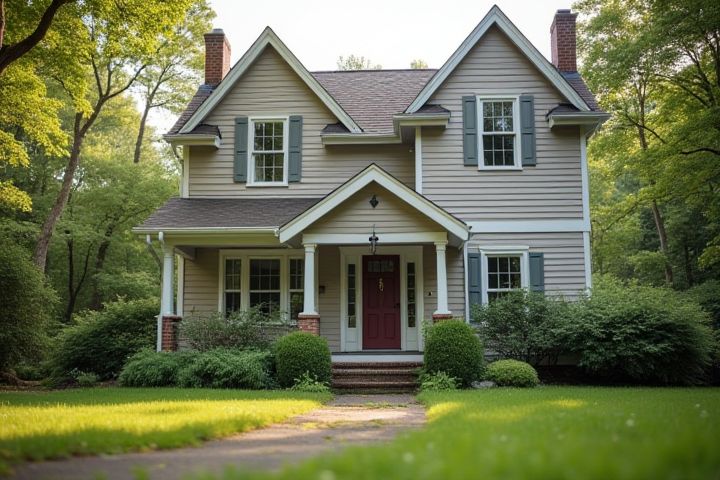
Flipping a house can be a lucrative investment strategy if executed thoughtfully, yet it requires careful planning and market analysis. You must assess the property's location, renovation costs, and potential resale value to ensure profitability. Understanding your local real estate market dynamics, including buyer demand and price trends, is crucial for success. Effective budgeting and time management are essential; unexpected repairs can quickly erode your margins. Lastly, you should also consider your own experience and risk tolerance before diving into this competitive venture.
Is It Worth Flipping A House
Market conditions
Flipping a house can be a lucrative venture, particularly when market conditions are favorable. In a seller's market, characterized by high demand and low inventory, you can often sell renovated properties quickly at a premium price. Conversely, in a buyer's market, where supply exceeds demand, the potential for profit diminishes, making it a less attractive option. Analyzing local real estate trends, property appreciation rates, and neighborhood development plans is crucial to maximizing your investment and ensuring a successful flip.
Budget planning
Budget planning is crucial when flipping a house, as it directly affects potential profitability. Your renovation expenses, including material costs and labor, should ideally be allocated within a 10-20% margin of the total purchase price. Property taxes, insurance, and unexpected repairs can also add up, so it's wise to include a contingency fund of at least 15% to cover surprises. By carefully tracking these expenses and adhering to your budget, you can maximize your return on investment and ensure a successful flip.
Location analysis
Location analysis is crucial when considering house flipping, as properties in desirable neighborhoods tend to appreciate faster and attract more buyers. A thorough evaluation of local amenities, school districts, and crime rates can significantly influence property values. Areas with upcoming infrastructure developments or revitalization projects often yield higher returns on investment. Researching real estate trends and market demand in specific locations helps ensure your flipping venture is financially rewarding.
Renovation costs
Flipping a house can yield significant profits, but understanding your renovation costs is crucial. You should carefully evaluate each aspect of the project, from structural repairs to cosmetic upgrades, as these expenses can quickly accumulate. Prioritize high-impact renovations, such as kitchen and bathroom remodels, which often provide the best return on investment. By accurately estimating your renovation costs and comparing them to potential market gains, you can make informed decisions that enhance your property's value.
Skillset and expertise
Flipping a house requires specific skills and expertise in areas such as real estate market analysis, renovation techniques, and project management. Successful flippers often have a solid understanding of property valuation, typically leveraging local market trends to identify profitable opportunities, which can yield profit margins ranging from 20% to 30% per project. A background in construction or design can significantly reduce renovation costs, with typical expenses averaging $30,000 to $60,000 for a full overhaul. Your ability to network with contractors and real estate agents also plays a pivotal role in maximizing returns on investment.
Time commitment
Flipping a house requires substantial time commitment, often demanding months of planning, renovation, and marketing. You'll need to dedicate time to research the real estate market, evaluate potential properties, and secure financing. Once a property is acquired, extensive renovations may involve coordinating contractors, sourcing materials, and managing timelines to ensure cost-effective improvements. Your success in house flipping largely hinges on your ability to balance these time-intensive tasks while navigating challenges that can arise during the process.
Financing options
Flipping a house can be a lucrative investment, but the success often hinges on smart financing options. Traditional mortgages might not work for quick flips, so consider hard money loans, which provide short-term funding based on the property's value rather than your credit score. You can also explore private money lenders, who may offer flexible terms and quicker access to cash, allowing you to seize opportunities in a competitive market. Understanding the costs associated with financing, such as interest rates and repayment schedules, is essential to maximize your profit margin on the property flip.
Legal considerations
When considering flipping a house, understanding the legal implications is crucial for your success. You must ensure that the property complies with local zoning laws, which can dictate what renovations are permissible and how you can utilize the property. Additionally, obtaining the necessary permits for renovation work is essential; failure to secure these can result in hefty fines or costly delays. Finally, comprehending the potential liabilities, such as lead paint disclosure or compliance with short-term rental laws, will protect you and enhance the profitability of your investment.
Resale potential
Flipping a house can be a lucrative venture, especially if you focus on resale potential. Key factors influencing profitability include location, with 53% of homebuyers prioritizing proximity to schools and amenities. Estimated renovation costs can range from $20,000 to $50,000, yet a well-executed flip might yield returns of 30% or more. Analyzing market trends, such as average days on market, helps you identify the right time to buy and sell, ensuring a successful flip.
Profit margins
Flipping a house can yield significant profit margins, often ranging from 10% to 20% if executed correctly. Key factors influencing profitability include the initial purchase price, renovation costs, and the current real estate market conditions. You should conduct comprehensive market research to identify desirable neighborhoods and properties with potential for appreciation. By carefully managing your budget and timelines, you can maximize your return on investment while minimizing risks associated with unforeseen expenses.
